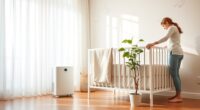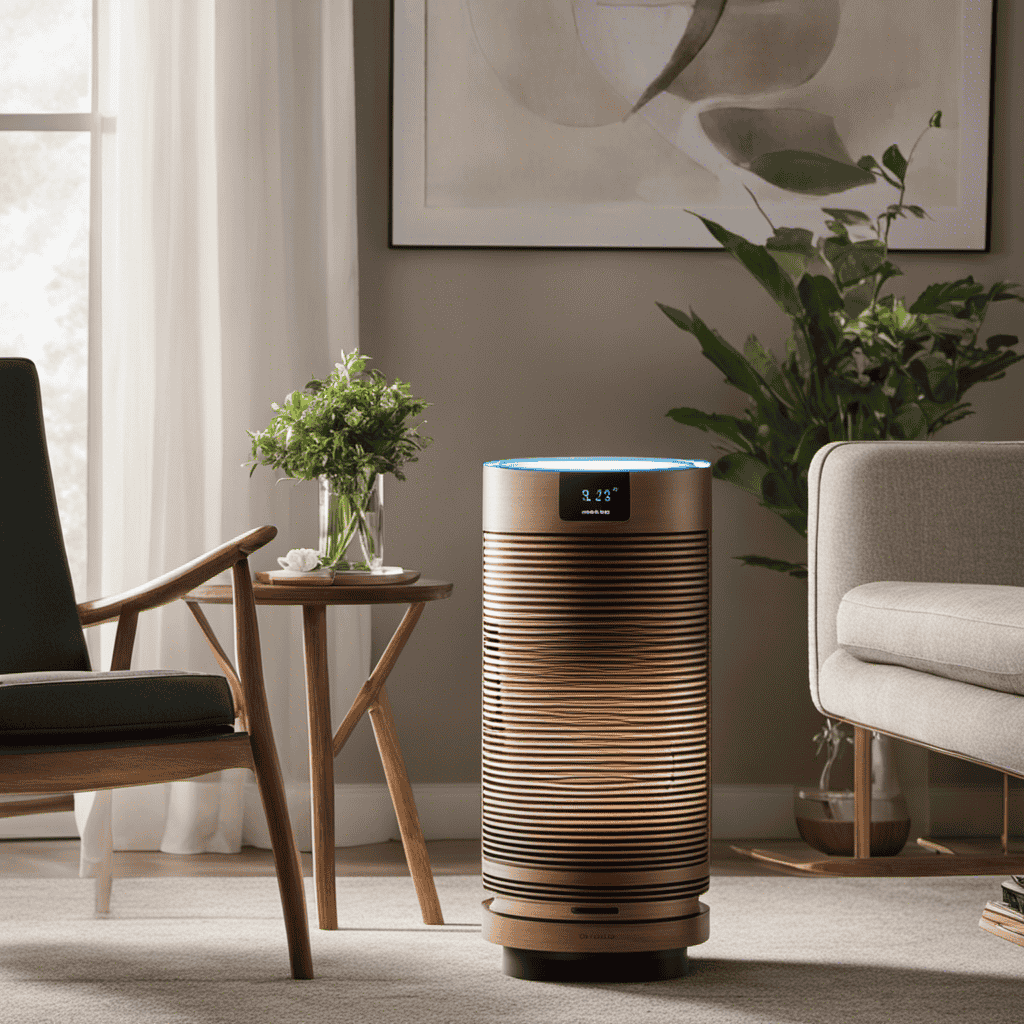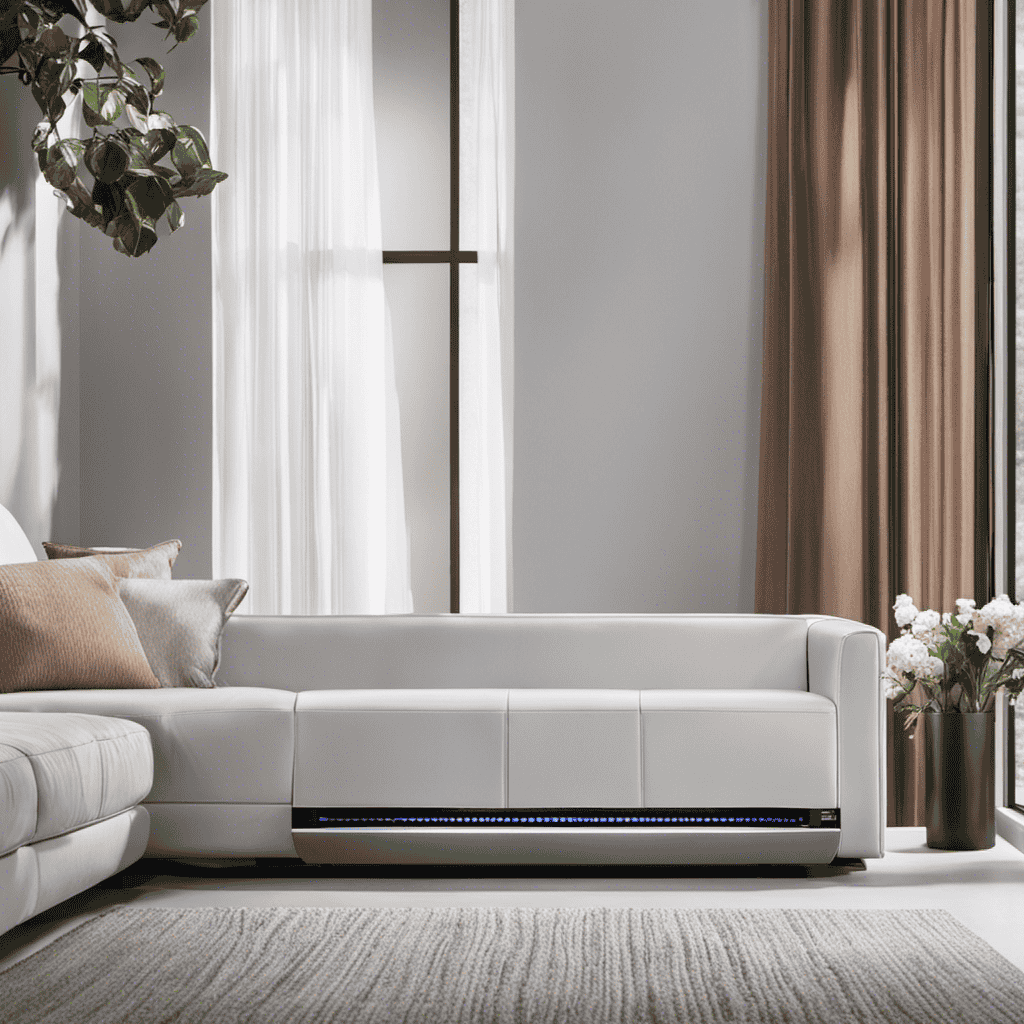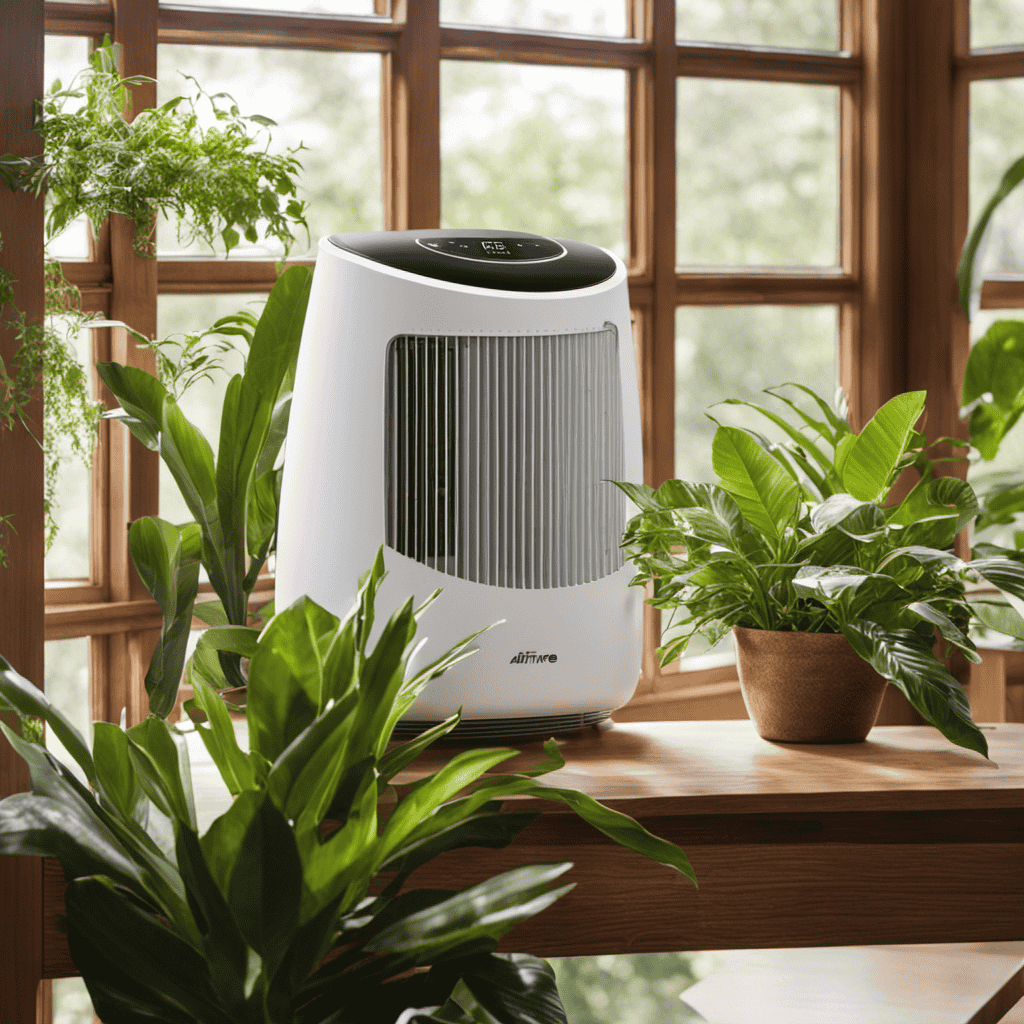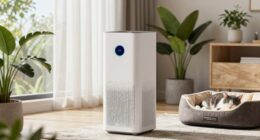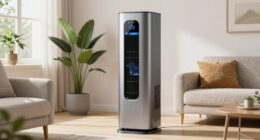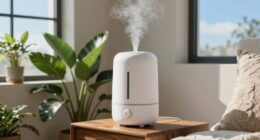If your air purifier smells bad, it’s likely due to dust, mold, bacteria, or trapped odors building up inside over time. Clogged filters, high humidity, or poor ventilation can also cause musty or stale smells. Pet dander, household chemicals, or external odors may contribute as well. Regular cleaning, filter replacements, and proper airflow can help eliminate the odor. To find proven solutions, keep exploring to discover how to freshen your air effectively.
Key Takeaways
- Accumulation of dust, debris, and odors on filters and internal surfaces causes stale smells, requiring regular cleaning or replacement.
- Mold, bacteria, or mildew growth inside or around the unit produce musty odors, often due to excess moisture or poor ventilation.
- External sources like cooking fumes, pet dander, or smoke can cling to furniture and filters, intensifying odors inside the purifier.
- High humidity and damp environments promote mold development, leading to persistent, musty smells from inside and around the air purifier.
- Inadequate maintenance, such as infrequent filter changes and uncleaned surfaces, allows microbial buildup and odor-causing bacteria to flourish.
Accumulation of Dust and Debris
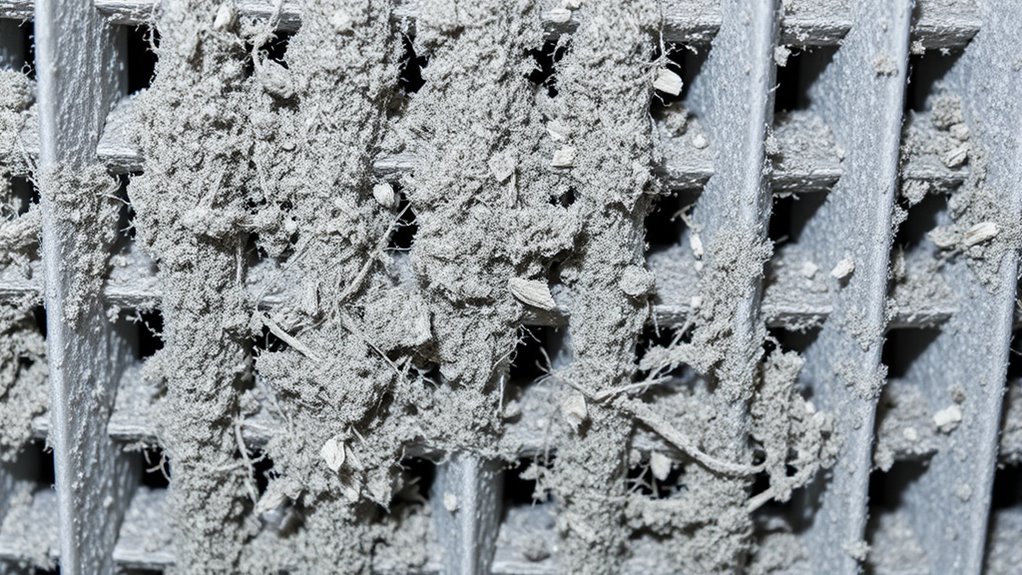
Dust and debris tend to build up inside your air purifier over time, which can considerably affect its performance. When this happens, airborne allergens like pollen, pet dander, and dust mites can accumulate on filters, reducing their effectiveness. Additionally, chemical fumes from cleaning products, paints, or fragrances can settle inside the unit, creating unpleasant odors and potentially harming your air quality. As debris collects, the purifier works harder to circulate clean air, which can lead to a musty smell or stale air. Regularly cleaning or replacing filters helps prevent this buildup, ensuring your device efficiently traps airborne allergens and keeps chemical fumes at bay. Proper filter maintenance and timely replacements are essential to prevent odors and maintain optimal air purification. Keeping your purifier free of dust and debris is essential for air quality and a fresher indoor environment. For optimal performance, it’s also important to consider the filter material used in your device, as different materials can impact odor control and filtration efficiency.
Mold and Mildew Growth
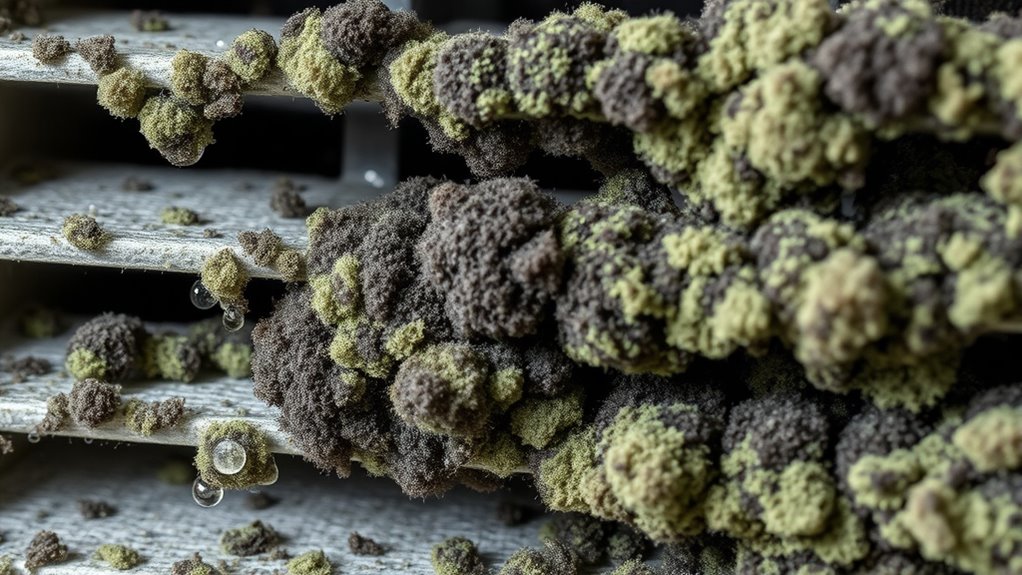
Hidden moisture can create the perfect environment for mold and mildew to grow. Damp spaces and poor ventilation make it worse, leading to unpleasant smells and health risks. Regular maintenance, like fixing leaks and keeping areas dry, helps prevent these issues from taking hold.
Hidden Moisture Accumulation
Moisture can silently accumulate in your home, creating the perfect environment for mold and mildew to thrive behind walls, under carpets, or within hidden corners. Hidden moisture often results from condensation buildup on windows, pipes, or poorly ventilated areas. This excess moisture can go unnoticed, but it markedly impacts your indoor air quality and the smell of your air purifier. When condensation collects in unseen spots, it provides a breeding ground for mold spores and mildew growth. Over time, these fungi release musty odors that your air purifier may pick up. To prevent this, regularly check for signs of hidden moisture, improve ventilation, and address any sources of condensation buildup promptly. Keeping moisture levels low helps reduce mold growth and keeps your air fresh. Additionally, understanding electric power generation with bike generators can inspire alternative methods to manage humidity levels or power small dehumidifiers in problem areas, and proper ventilation techniques are essential in controlling indoor humidity effectively. Ensuring proper air circulation can also help prevent moisture accumulation and inhibit mold development.
Damp Environment Effects
Damp environments provide ideal conditions for mold and mildew to flourish, posing health risks and damaging your home. When moisture buildup occurs, it creates a damp environment that encourages these fungi to grow on surfaces and inside your air purifier. Mold spores thrive in humid conditions, releasing musty odors that your purifier may pick up and circulate. This growth not only affects air quality but can also cause allergic reactions or respiratory issues. To prevent mold and mildew, you need to control moisture levels and reduce dampness in your space. Regularly managing humidity and addressing moisture buildup are essential steps to keep your environment fresh and safe. Proper ventilation can help reduce indoor humidity and inhibit mold growth, further preventing odors from developing. Monitoring indoor moisture levels is also crucial in maintaining a healthy environment and avoiding the formation of mold and mildew.
Preventative Maintenance Tips
To prevent mold and mildew from taking hold in your air purifier and surrounding environment, regular maintenance is essential. Start by replacing the filters according to the manufacturer’s schedule, as old or dirty filters can harbor mold spores. Consistently check for signs of mold and replace filters promptly to keep your unit functioning effectively. Additionally, perform thorough unit cleaning regularly—wipe down surfaces, vents, and filters with a damp cloth and mild detergent. Ensure the interior and exterior are dry before reinserting filters or turning the unit back on. Keeping your air purifier clean and maintaining fresh filters reduces moisture buildup and inhibits mold growth, helping your device operate efficiently and ensuring the air you breathe remains clean and free from unwanted odors. Being mindful of filter maintenance and proper airflow around the unit can further prevent moisture buildup and mold development. Incorporating moisture control techniques around your space can also significantly decrease the risk of mold and mildew formation. Regularly inspecting for humidity levels and using dehumidifiers when necessary can further reduce the likelihood of mold growth in your environment. Moreover, understanding the importance of air quality management can contribute to a healthier indoor space.
A comprehensive understanding of emergency preparedness essentials can also help in managing indoor air quality issues during crises, ensuring your environment remains safe and healthy.
Bacterial and Viral Buildup
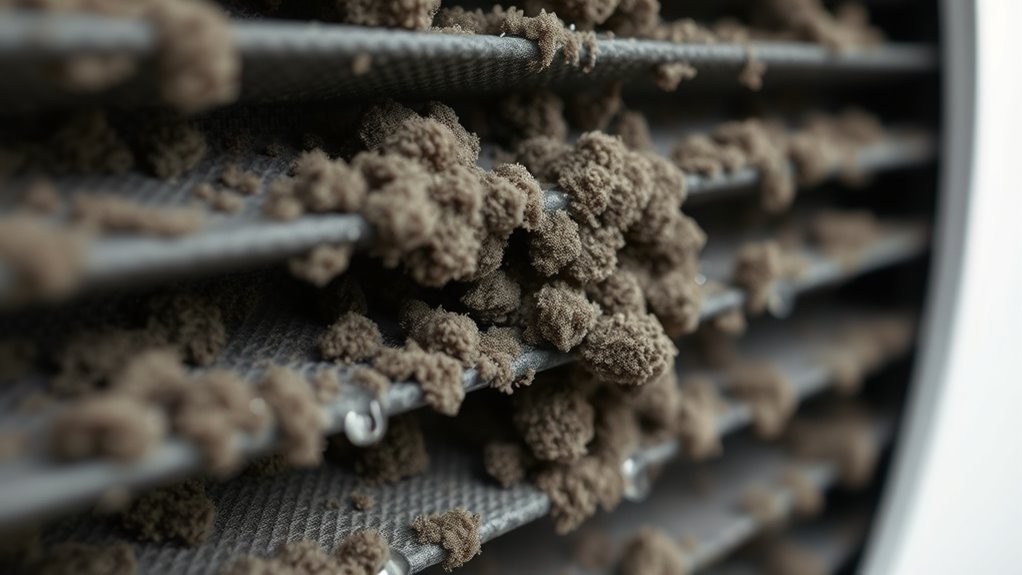
Bacterial and viral buildup can occur quickly inside your air purifier if it isn’t cleaned regularly. Airborne pathogens and surface contamination can settle on filters and internal components, creating a breeding ground for bacteria and viruses. This buildup not only diminishes your purifier’s effectiveness but can also cause unpleasant odors. To keep your device safe and odor-free, regular cleaning is essential. Proper hygiene practices can help minimize the risk of contamination inside your air purifier. Additionally, understanding filtration efficiency can guide you in maintaining optimal performance. Regularly replacing or cleaning filters enhances air quality and prevents the accumulation of harmful germs. Maintaining proper maintenance routines is crucial for preventing germ buildup and ensuring your air stays fresh and healthy. Being aware of contaminant sources can help you take proactive steps to reduce the risk of buildup inside your device. Here’s a quick overview:
| Contaminant | Impact |
|---|---|
| Airborne pathogens | Spread infection if not removed |
| Surface contamination | Contribute to foul smells and bacteria |
| Bacterial/Viral buildup | Reduce air quality and safety |
Clogged or Dirty Filters

When filters become clogged or dirty, dust quickly builds up, reducing your air purifier’s efficiency. Bacteria and mold can grow inside the filters and unit if you don’t replace or clean them regularly. This buildup not only hampers performance but can also cause unpleasant odors to develop. Regular filter replacement and maintenance are essential to prevent HEPA filtration from becoming ineffective and to maintain fresh, odor-free air. Additionally, incorporating automation in maintenance routines can help remind you when to check or replace filters, ensuring optimal air quality. Proper filter maintenance can also extend the lifespan of your device and improve overall indoor air quality.
Filter Accumulation of Dust
A clogged or dirty filter in your air purifier can substantially diminish its effectiveness and cause unpleasant odors. Dust buildup blocks airflow, forcing your device to work harder, which can degrade air quality and shorten the filter lifespan. To visualize, consider this table:
| Clean Filter | Dusty Filter |
|---|---|
| Air flows freely, fresh air flows | Restricted airflow, stale air |
| Maintains ideal air quality | Reduced effectiveness |
| Long filter lifespan | Frequent replacements needed |
| No odors or mustiness | Unpleasant smells emerge |
Regularly checking and replacing or cleaning your filter ensures your purifier performs at its best. Keeping dust at bay preserves air quality and prevents odors caused by accumulated debris. Additionally, using appropriate oils for your purifier can help maintain a fresh scent and improve air quality. Proper maintenance and regular filter replacement are essential to prevent odor-causing buildup and ensure your air purifier functions efficiently. Regularly inspecting filters can also help detect early signs of damage, extending the lifespan of your device. Moreover, adhering to manufacturer guidelines for filter replacement intervals can further optimize performance and prevent odor issues. Implementing advanced filtration technologies can also significantly reduce persistent smells and improve overall air purification.
Bacterial Growth in Filters
A dirty or clogged filter doesn’t just reduce airflow and air quality—it also creates a breeding ground for bacteria. When filters become clogged with dust and debris, bacteria can thrive on the surface, leading to unpleasant smells and potential health risks. To combat this, many filters now feature antibacterial coatings that inhibit bacterial growth directly on the filter media. Additionally, UV sterilization integrated into some air purifiers kills bacteria and other microorganisms as air passes through. Regularly replacing or cleaning your filters prevents bacterial buildup and maintains air quality. Using filters with antibacterial coatings and UV sterilization greatly reduces bacteria in your purifier, helping to eliminate odors caused by microbial growth and ensuring your air stays fresh and safe. Enhanced natural language processing also plays a role in improving the detection of microbial contamination, contributing to better maintenance and odor control. Moreover, bacterial growth in filters can be exacerbated if filters are neglected over time, emphasizing the importance of consistent upkeep. Implementing Volkswagen Tuning techniques, such as upgrading filters with specialized coatings, can further improve overall air purifier efficiency and odor control.
Mold Development in Units
Clogged or dirty filters create an ideal environment for mold growth inside your air purifier. When filters are blocked or neglected, moisture and organic debris accumulate, fostering mold development. Poor air purifier design can trap moisture and restrict airflow, increasing humidity inside the unit. Additionally, improper unit placement—such as near sources of moisture or in damp areas—exacerbates the problem. Mold thrives in these conditions, leading to musty odors and potential health issues. Regularly replacing or cleaning filters is essential to prevent mold growth. Keep your air purifier in a dry, well-ventilated space and avoid placing it in humid environments. Proper maintenance and strategic placement help ensure your unit stays mold-free and continues to improve your indoor air quality.
Trapped Odors From Surroundings
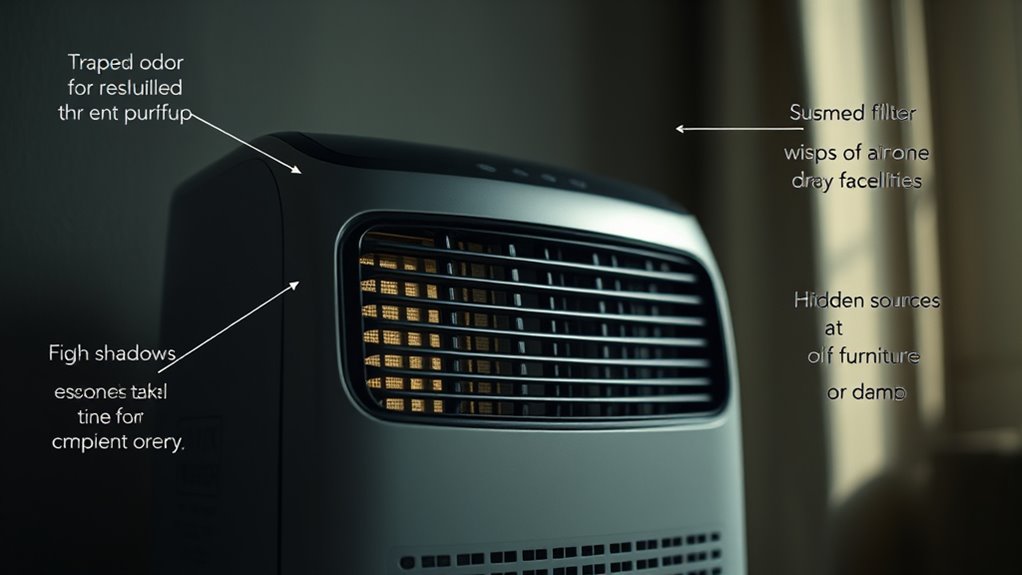
Ever wonder why certain odors seem to linger even after your air purifier runs? The answer could be trapped odors from your surroundings. External odor sources like cooking fumes, pet smells, or smoke can seep into your space, sticking to furniture or carpets, making your purifier work harder. To minimize this, consider:
- Reducing air freshener usage, which can add to smell buildup.
- Sealing windows and doors to limit outside odors.
- Regularly cleaning or vacuuming carpets and upholstery.
- Positioning your purifier away from strong odor sources for better airflow.
These steps help your purifier focus on filtering trapped odors rather than battling ongoing external smells. Remember, persistent odors often originate outside the device, so addressing these sources will improve your air quality and reduce smells.
Moisture and High Humidity Issues
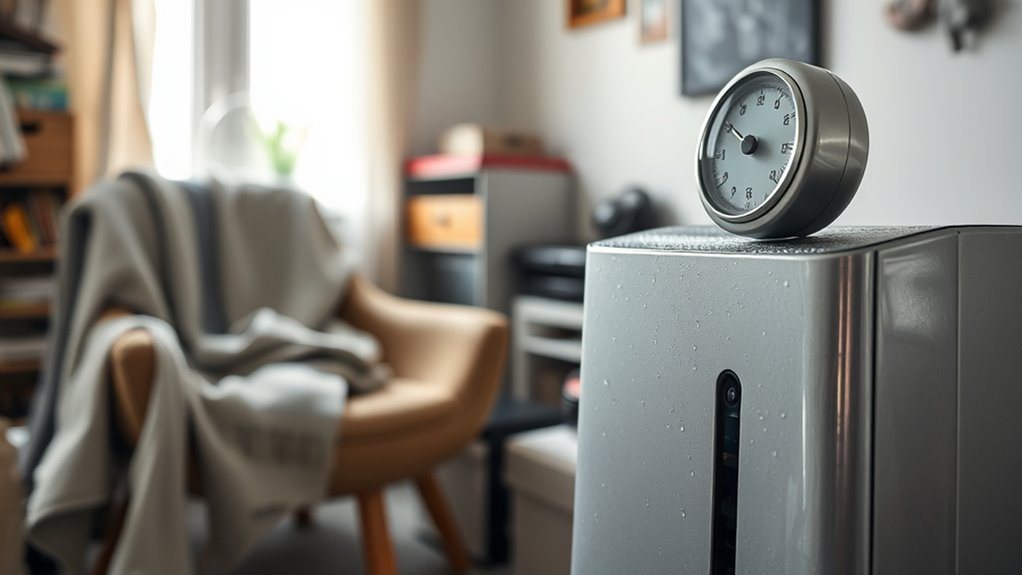
High humidity levels can considerably affect your air purifier’s performance, leading to increased odors and mold growth. When indoor humidity is too high, condensation buildup can occur on the purifier’s filters and internal components. This moisture creates an ideal environment for mold and bacteria to thrive, which can cause musty smells and reduce your device’s effectiveness. To prevent this, monitor your indoor humidity levels with a hygrometer and keep them between 30-50%. Use a dehumidifier if necessary to control excess moisture. Regularly clean or replace your filters to remove trapped moisture and prevent mold spores from spreading. Keeping humidity in check not only reduces unpleasant smells but also prolongs the lifespan of your air purifier.
Poor Air Circulation or Ventilation

Poor air circulation or ventilation can lead to stagnant indoor air, allowing odors to accumulate and linger. When airflow is blocked or ventilation issues occur, your air purifier struggles to filter fresh air effectively. This can cause unpleasant smells to persist despite running the device. To improve airflow:
Poor ventilation causes stale air and lingering odors, making air purifiers less effective.
- Ensure vents and intake grills are unobstructed.
- Open windows or doors regularly to promote natural ventilation.
- Avoid overcrowding rooms, which hampers air movement.
- Check for any airflow blockage caused by furniture or curtains.
Addressing ventilation issues helps prevent stale air from settling and keeps your purifier working efficiently. Good circulation reduces odor buildup and ensures cleaner, fresher indoor air. Proper ventilation is key to avoiding smell problems related to poor airflow.
Contaminants From Pets or Household Items
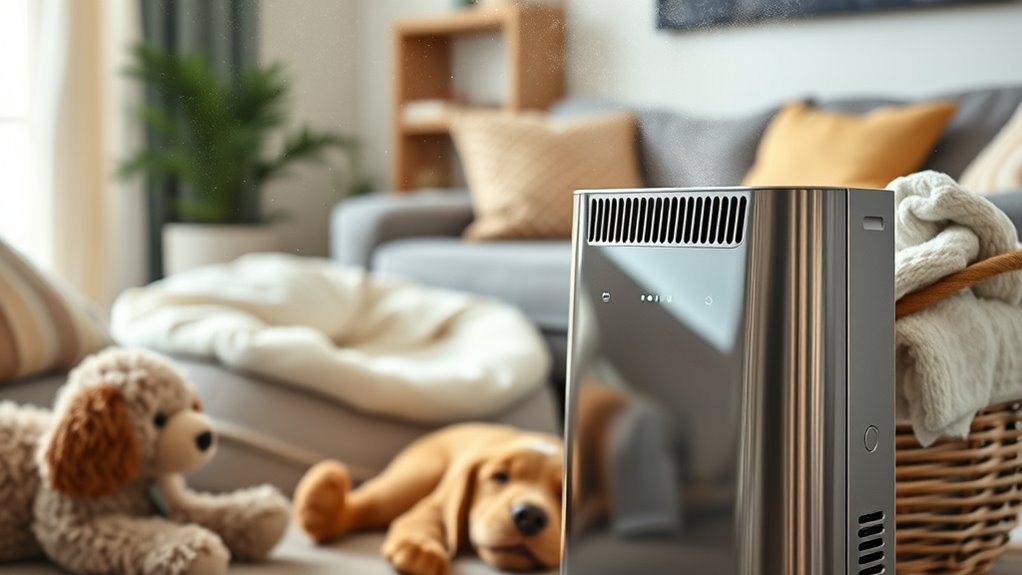
Contaminants from pets and household items can substantially contribute to persistent odors even when your air circulation is adequate. Pet dander often lingers in the air and on surfaces, releasing a musty smell that your air purifier might struggle to eliminate completely. Household chemicals, such as cleaning products, air fresheners, and aerosols, also release volatile organic compounds (VOCs) that can cause a lingering chemical scent. These odors can build up over time, making your air purifier seem ineffective or causing it to smell itself. Regularly cleaning surfaces, washing pet bedding, and reducing the use of strong household chemicals can help. Additionally, upgrading your air purifier to one with activated carbon filters can better absorb these odors, improving your indoor air quality.
Neglecting Regular Maintenance and Cleaning
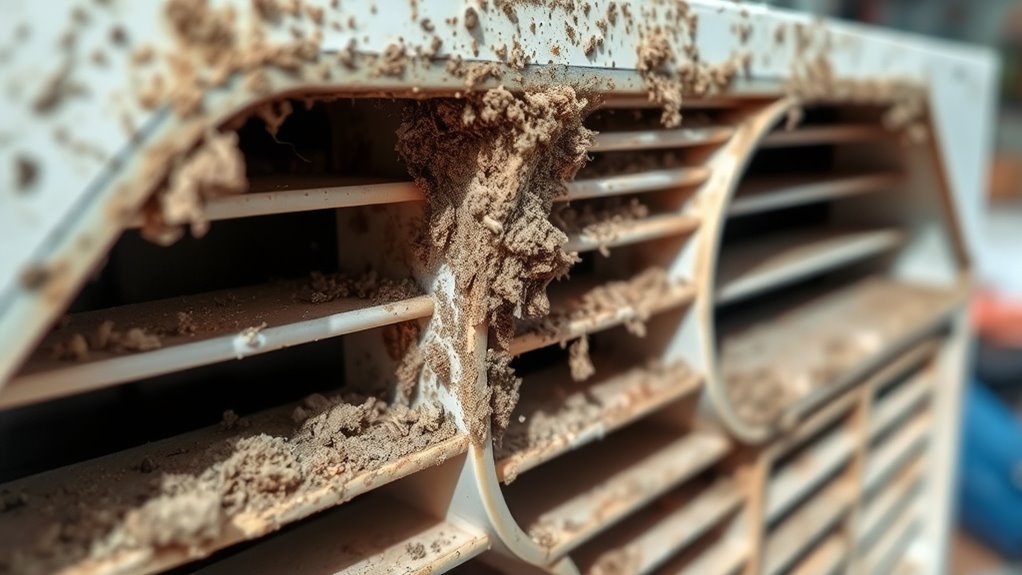
Neglecting regular maintenance and cleaning can substantially diminish your air purifier’s effectiveness and contribute to persistent odors. Over time, dust, dirt, and debris build up, making filter replacement less effective and causing unpleasant smells. To keep your unit functioning at its best, you should:
- Replace filters regularly according to the manufacturer’s schedule.
- Clean the exterior and vents to prevent dust buildup.
- Perform thorough unit cleaning to remove accumulated grime.
- Check for mold or bacteria growth, especially if odors persist.
Failing to maintain your air purifier reduces its ability to filter pollutants and can trap odors instead of eliminating them. Consistent filter replacement and diligent unit cleaning are essential to prevent smells and ensure fresh, clean air in your space.
Frequently Asked Questions
Can Air Purifiers Smell Due to Electrical Issues or Overheating?
Electrical problems or overheating issues can cause your air purifier to emit a smell. If components overheat or electrical wiring malfunctions, they may produce a burning or electrical odor. You should unplug the device immediately, check for signs of damage or overheating, and avoid using it until a professional inspects the unit. Addressing electrical issues promptly helps prevent further damage and guarantees safe operation, reducing unpleasant smells.
How Do Manufacturing Residues Cause Odors in New Air Purifiers?
You might worry about new device odors, but manufacturing residues are often the culprit. These residues, like oils or chemicals from production, can emit unpleasant smells when you first turn on your air purifier. It’s normal for new devices to have these odors, which usually fade after a few hours of operation. Ventilating the room or running the purifier on a higher setting helps dissipate manufacturing residues quickly.
Are Scented Air Fresheners Responsible for Lingering Smells in Purifiers?
Scented sprays and perfume residues can cause lingering smells in your air purifier. When you use these products nearby or directly on the device, the residues settle into the filters and internal components. Over time, these scents can build up, making your purifier emit unwanted odors. To fix this, avoid using scented sprays around your purifier, and clean or replace filters regularly to remove any residual perfume odors.
Can a Malfunctioning Fan Cause Unpleasant Odors in My Air Purifier?
A fan malfunction can turn your air purifier into a sneaky odor monster, causing unpleasant smells to spread everywhere. When the fan doesn’t work properly, it can’t circulate air effectively, trapping odors inside and making them worse. This malfunction allows stale air and musty smells to linger, turning your purifier into a source of foul odor circulation. Fixing the fan guarantees fresh air flows and keeps those bad smells at bay.
Do Air Purifiers Absorb and Emit Odors From External Sources?
Your air purifier doesn’t absorb external odors like a sponge, but it filters them out through its filtration system. When you run it, the filtration captures external odors from sources like cooking or pets, preventing them from spreading. However, if your purifier isn’t maintained or filters are dirty, it might emit or fail to eliminate these odors effectively. Regularly replacing filters keeps your air purifier working at its best against external odors.
Conclusion
Sometimes, a lingering smell from your air purifier hints at more than just neglect—it’s like a quiet reminder that your home’s environment and your habits are intertwined. Regular cleaning and maintenance not only keep the air fresh but also subtly reflect how you care for your space. When you stay attentive to your purifier’s needs, you might find that fresh, clean air becomes a natural coincidence—an effortless part of your everyday life.

